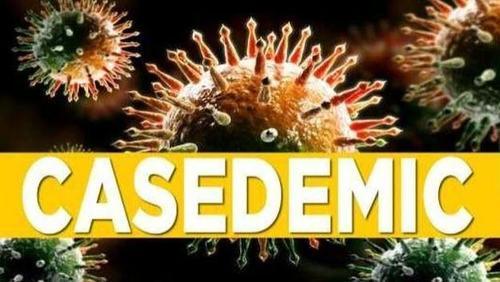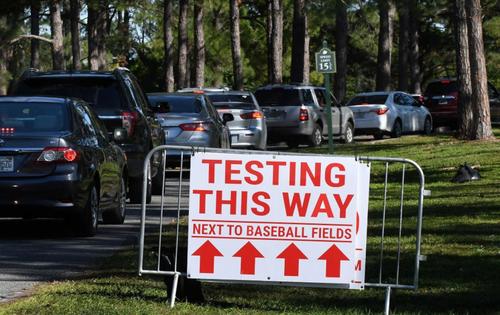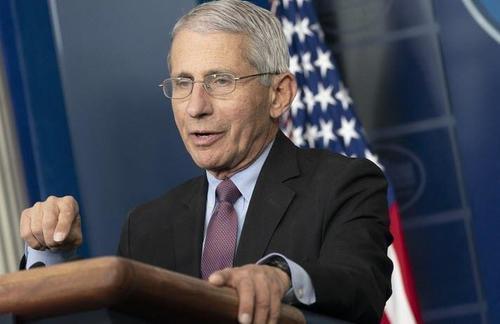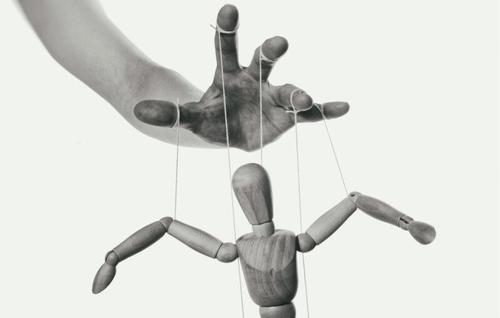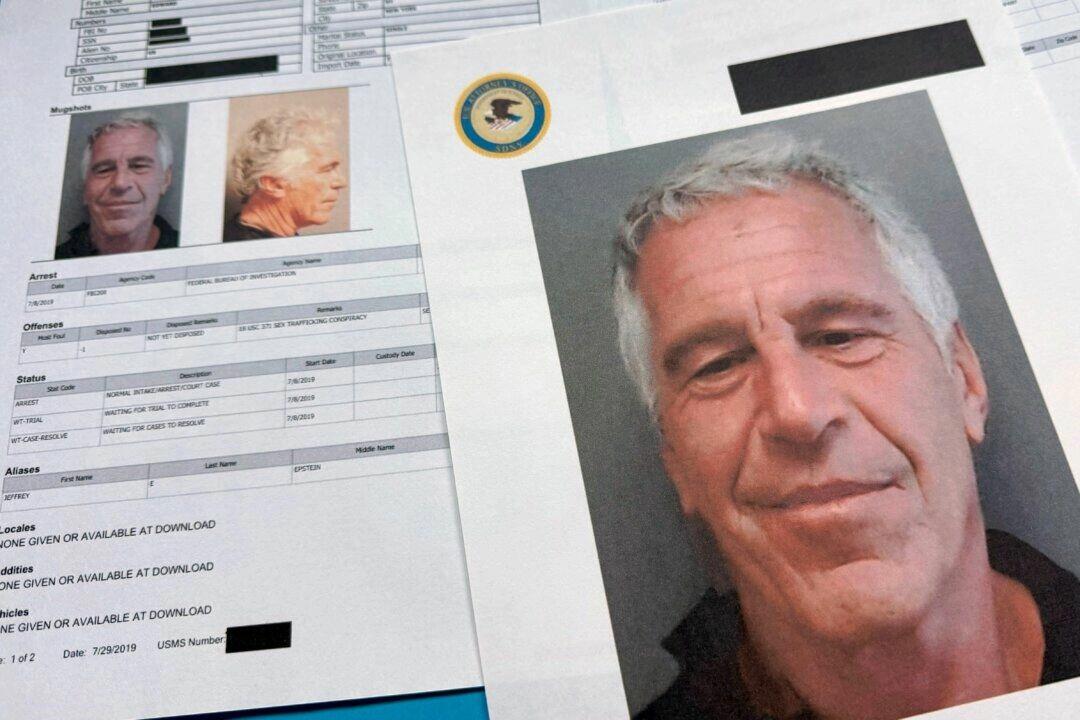After a year and a half of non-stop panic, it should be time to pause and reflect on what really took place over that time. This is what this article does.
The conclusion is ominous, it is not the people who are sick, it is our society and for this, there is no vaccine.
Authored by John Tierney via City-Journal.com,
Fearmongering from journalists, scientists, and politicians did more harm than the virus...
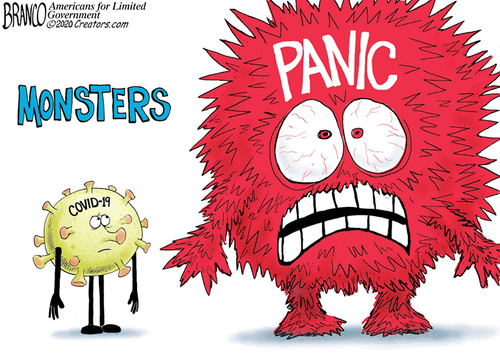
The United States suffered through two lethal waves of contagion in the past year and a half. The first was a viral pandemic that killed about one in 500 Americans—typically, a person over 75 suffering from other serious conditions. The second, and far more catastrophic, was a moral panic that swept the nation’s guiding institutions.
Instead of keeping calm and carrying on, the American elite flouted the norms of governance, journalism, academic freedom—and, worst of all, science. They misled the public about the origins of the virus and the true risk that it posed. Ignoring their own carefully prepared plans for a pandemic, they claimed unprecedented powers to impose untested strategies, with terrible collateral damage. As evidence of their mistakes mounted, they stifled debate by vilifying dissenters, censoring criticism, and suppressing scientific research.
If, as seems increasingly plausible, the coronavirus that causes Covid-19 leaked out of a laboratory in Wuhan, it is the costliest blunder ever committed by scientists. Whatever the pandemic’s origin, the response to it is the worst mistake in the history of the public-health profession. We still have no convincing evidence that the lockdowns saved lives, but lots of evidence that they have already cost lives and will prove deadlier in the long run than the virus itself.
One in three people worldwide lost a job or a business during the lockdowns, and half saw their earnings drop, according to a Gallup poll. Children, never at risk from the virus, in many places essentially lost a year of school. The economic and health consequences were felt most acutely among the less affluent in America and in the rest of the world, where the World Bank estimates that more than 100 million have been pushed into extreme poverty.
The leaders responsible for these disasters continue to pretend that their policies worked and assume that they can keep fooling the public. They’ve promised to deploy these strategies again in the future, and they might even succeed in doing so—unless we begin to understand what went wrong.
The panic was started, as usual, by journalists. As the virus spread early last year, they highlighted the most alarming statistics and the scariest images: the estimates of a fatality rate ten to 50 times higher than the flu, the chaotic scenes at hospitals in Italy and New York City, the predictions that national health-care systems were about to collapse.
The full-scale panic was set off by the release in March 2020 of a computer model at the Imperial College in London, which projected that—unless drastic measures were taken—intensive-care units would have 30 Covid patients for every available bed and that America would see 2.2 million deaths by the end of the summer. The British researchers announced that the “only viable strategy” was to impose draconian restrictions on businesses, schools, and social gatherings until a vaccine arrived.
This extraordinary project was swiftly declared the “consensus” among public-health officials, politicians, journalists, and academics. Anthony Fauci, director of the National Institute of Allergy and Infectious Diseases, endorsed it and became the unassailable authority for those purporting to “follow the science.” What had originally been a limited lockdown—“15 days to slow the spread”—became long-term policy across much of the United States and the world. A few scientists and public-health experts objected, noting that an extended lockdown was a novel strategy of unknown effectiveness that had been rejected in previous plans for a pandemic. It was a dangerous experiment being conducted without knowing the answer to the most basic question: Just how lethal is this virus?
The most prominent early critic was John Ioannidis, an epidemiologist at Stanford, who published an essay for STAT headlined “A Fiasco in the Making? As the Coronavirus Pandemic Takes Hold, We Are Making Decisions Without Reliable Data.” While a short-term lockdown made sense, he argued, an extended lockdown could prove worse than the disease, and scientists needed to do more intensive testing to determine the risk. The article offered common-sense advice from one of the world’s most frequently cited authorities on the credibility of medical research, but it provoked a furious backlash on Twitter from scientists and journalists.
The fury intensified in April 2020, when Ioannidis followed his own advice by joining with Jay Bhattacharya and other colleagues from Stanford to gauge the spread of Covid in the surrounding area, Santa Clara County. After testing for Covid antibodies in the blood of several thousand volunteers, they estimated that the fatality rate among the infected in the county was about 0.2 percent, twice as high as for the flu but considerably lower than the assumptions of public-health officials and computer modelers. The researchers acknowledged that the fatality rate could be substantially higher in other places where the virus spread extensively in nursing homes (which hadn’t yet occurred in the Santa Clara area). But merely by reporting data that didn’t fit the official panic narrative, they became targets.
Other scientists lambasted the researchers and claimed that methodological weaknesses in the study made the results meaningless. A statistician at Columbia wrote that the researchers “owe us all an apology.” A biologist at the University of North Carolina said that the study was “horrible science.” A Rutgers chemist called Ioannidis a “mediocrity” who “cannot even formulate a simulacrum of a coherent, rational argument.” A year later, Ioannidis still marvels at the attacks on the study (which was eventually published in a leading epidemiology journal). “Scientists whom I respect started acting like warriors who had to subvert the enemy,” he says. “Every paper I’ve written has errors—I’m a scientist, not the pope—but the main conclusions of this one were correct and have withstood the criticism.”
Mainstream journalists piled on with hit pieces quoting critics and accusing the researchers of endangering lives by questioning lockdowns. The Nation called the research a “black mark” for Stanford. The cheapest shots came from BuzzFeed, which devoted thousands of words to a series of trivial objections and baseless accusations. The article that got the most attention was BuzzFeed’s breathless revelation that an airline executive opposed to lockdowns had contributed $5,000—yes, five thousand dollars!—to an anonymized fund at Stanford that had helped finance the Santa Clara fieldwork.
The notion that a team of prominent academics, who were not paid for their work in the study, would risk their reputations by skewing results for the sake of a $5,000 donation was absurd on its face—and even more ludicrous, given that Ioannidis, Bhattacharya, and the lead investigator, Eran Bendavid, said that they weren’t even aware of the donation while conducting the study. But Stanford University was so cowed by the online uproar that it subjected the researchers to a two-month fact-finding inquiry by an outside legal firm. The inquiry found no evidence of conflict of interest, but the smear campaign succeeded in sending a clear message to scientists everywhere: Don’t question the lockdown narrative.
In a brief interlude of journalistic competence, two veteran science writers, Jeanne Lenzer and Shannon Brownlee, published an article in Scientific American decrying the politicization of Covid research. They defended the integrity and methodology of the Stanford researchers, noting that some subsequent studies had found similar rates of fatality among the infected. (In his latest review of the literature, Ioannidis now estimates that the average fatality rate in Europe and the Americas is 0.3 to 0.4 percent and about 0.2 percent among people not living in institutions.) Lenzer and Brownlee lamented that the unjust criticism and ad hominem vitriol had suppressed a legitimate debate by intimidating the scientific community. Their editors then proceeded to prove their point. Responding to more online fury, Scientific American repented by publishing an editor’s note that essentially repudiated its own article. The editors printed BuzzFeed’s accusations as the final word on the matter, refusing to publish a rebuttal from the article’s authors or a supporting letter from Jeffrey Flier, former dean of Harvard Medical School. Scientific American, long the most venerable publication in its field, now bowed to the scientific authority of BuzzFeed.
Editors of research journals fell into line, too. When Thomas Benfield, one of the researchers in Denmark conducting the first large randomized controlled trial of mask efficacy against Covid, was asked why they were taking so long to publish the much-anticipated findings, he promised them as “as soon as a journal is brave enough to accept the paper.” After being rejected by The Lancet, The New England Journal of Medicine, and JAMA, the study finally appeared in the Annals of Internal Medicine, and the reason for the editors’ reluctance became clear: the study showed that a mask did not protect the wearer, which contradicted claims by the Centers for Disease Control and other health authorities.
Stefan Baral, an epidemiologist at Johns Hopkins with 350 publications to his name, submitted a critique of lockdowns to more than ten journals and finally gave up—the “first time in my career that I could not get a piece placed anywhere,” he said. Martin Kulldorff, an epidemiologist at Harvard, had a similar experience with his article, early in the pandemic, arguing that resources should be focused on protecting the elderly. “Just as in war,” Kulldorff wrote, “we must exploit the characteristics of the enemy in order to defeat it with the minimum number of casualties. Since Covid-19 operates in a highly age specific manner, mandated counter measures must also be age specific. If not, lives will be unnecessarily lost.” It was a tragically accurate prophecy from one of the leading experts on infectious disease, but Kulldorff couldn’t find a scientific journal or media outlet to accept the article, so he ended up posting it on his own LinkedIn page. “There’s always a certain amount of herd thinking in science,” Kulldorff says, “but I’ve never seen it reach this level. Most of the epidemiologists and other scientists I’ve spoken to in private are against lockdowns, but they’re afraid to speak up.”
To break the silence, Kulldorff joined with Stanford’s Bhattacharya and Sunetra Gupta of Oxford to issue a plea for “focused protection,” called the Great Barrington Declaration. They urged officials to divert more resources to shield the elderly, such as doing more tests of the staff at nursing homes and hospitals, while reopening business and schools for younger people, which would ultimately protect the vulnerable as herd immunity grew among the low-risk population.
They managed to attract attention but not the kind they hoped for. Though tens of thousands of other scientists and doctors went on to sign the declaration, the press caricatured it as a deadly “let it rip” strategy and an “ethical nightmare” from “Covid deniers” and “agents of misinformation.” Google initially shadow-banned it so that the first page of search results for “Great Barrington Declaration” showed only criticism of it (like an article calling it “the work of a climate denial network”) but not the declaration itself. Facebook shut down the scientists’ page for a week for violating unspecified “community standards.”
The most reviled heretic was Scott Atlas, a medical doctor and health-policy analyst at Stanford’s Hoover Institution. He, too, urged focused protection on nursing homes and calculated that the medical, social, and economic disruptions of the lockdowns would cost more years of life than the coronavirus. When he joined the White House coronavirus task force, Bill Gates derided him as “this Stanford guy with no background” promoting “crackpot theories.” Nearly 100 members of Stanford’s faculty signed a letter denouncing his “falsehoods and misrepresentations of science,” and an editorial in the Stanford Daily urged the university to sever its ties to Hoover. The Stanford faculty senate overwhelmingly voted to condemn Atlas’s actions as “anathema to our community, our values and our belief that we should use knowledge for good.” Several professors from Stanford’s medical school demanded further punishment in a JAMA article, “When Physicians Engage in Practices That Threaten the Nation’s Health.” The article, which misrepresented Atlas’s views as well as the evidence on the efficacy of lockdowns, urged professional medical societies and medical-licensing boards to take action against Atlas on the grounds that it was “ethically inappropriate for physicians to publicly recommend behaviors or interventions that are not scientifically well grounded.”
But if it was unethical to recommend “interventions that are not scientifically well grounded,” how could anyone condone the lockdowns? “It was utterly immoral to conduct this society-wide intervention without the evidence to justify it,” Bhattacharya says. “The immediate results have been disastrous, especially for the poor, and the long-term effect will be to fundamentally undermine trust in public health and science.” The traditional strategy for dealing with pandemics was to isolate the infected and protect the most vulnerable, just as Atlas and the Great Barrington scientists recommended. The CDC’s pre-pandemic planning scenarios didn’t recommend extended school closures or any shutdown of businesses even during a plague as deadly as the 1918 Spanish flu. Yet Fauci dismissed the focused-protection strategy as “total nonsense” to “anybody who has any experience in epidemiology and infectious diseases,” and his verdict became “the science” to leaders in America and elsewhere.
Fortunately, a few leaders followed the science in a different way. Instead of blindly trusting Fauci, they listened to his critics and adopted the focused-protection strategy—most notably, in Florida. Its governor, Ron DeSantis, began to doubt the public-health establishment early in the pandemic, when computer models projected that Covid patients would greatly outnumber hospital beds in many states. Governors in New York, New Jersey, Pennsylvania, and Michigan were so alarmed and so determined to free up hospital beds that they directed nursing homes and other facilities to admit or readmit Covid patients—with deadly results.
But DeSantis was skeptical of the hospital projections—for good reason, as no state actually ran out of beds—and more worried about the risk of Covid spreading in nursing homes. He forbade long-term-care centers to admit anyone infected with Covid and ordered frequent testing of the staff at senior-care centers. After locking down last spring, he reopened businesses, schools, and restaurants early, rejected mask mandates, and ignored protests from the press and the state’s Democratic leaders. Fauci warned that Florida was “asking for trouble,” but DeSantis went on seeking and heeding advice from Atlas and the Great Barrington scientists, who were astonished to speak with a politician already familiar with just about every study they mentioned to him.
“DeSantis was an incredible outlier,” Atlas says. “He dug up the data and read the scientific papers and analyzed it all himself. In our discussions, he’d bounce ideas off me, but he was already on top of the details of everything. He always had the perspective to see the larger harms of lockdowns and the need to concentrate testing and other resources on the elderly. And he has been proven correct.”
If Florida had simply done no worse than the rest of the country during the pandemic, that would have been enough to discredit the lockdown strategy. The state effectively served as the control group in a natural experiment, and no medical treatment with dangerous side effects would be approved if the control group fared no differently from the treatment group. But the outcome of this experiment was even more damning.
Florida’s mortality rate from Covid is lower than the national average among those over 65 and also among younger people, so that the state’s age-adjusted Covid mortality rate is lower than that of all but ten other states. And by the most important measure, the overall rate of “excess mortality” (the number of deaths above normal), Florida has also done better than the national average. Its rate of excess mortality is significantly lower than that of the most restrictive state, California, particularly among younger adults, many of whom died not from Covid but from causes related to the lockdowns: cancer screenings and treatments were delayed, and there were sharp increases in deaths from drug overdoses and from heart attacks not treated promptly.
If the treatment group in a clinical trial were dying off faster than the control group, an ethical researcher would halt the experiment. But the lockdown proponents were undeterred by the numbers in Florida, or by similar results elsewhere, including a comparable natural experiment involving European countries with the least restrictive policies. Sweden, Finland, and Norway rejected mask mandates and extended lockdowns, and they have each suffered significantly less excess mortality than most other European countries during the pandemic.
A nationwide analysis in Sweden showed that keeping schools open throughout the pandemic, without masks or social distancing, had little effect on the spread of Covid, but school closures and mask mandates for students continued elsewhere. Another Swedish researcher, Jonas Ludvigsson, reported that not a single schoolchild in the country died from Covid in Sweden and that their teachers’ risk of serious illness was lower than for the rest of the workforce—but these findings provoked so many online attacks and threats that Ludvigsson decided to stop researching or discussing Covid.
Social-media platforms continued censoring scientists and journalists who questioned lockdowns and mask mandates. YouTube removed a video discussion between DeSantis and the Great Barrington scientists, on the grounds that it “contradicts the consensus” on the efficacy of masks, and also took down the Hoover Institution’s interview with Atlas. Twitter locked out Atlas and Kulldorff for scientifically accurate challenges to mask orthodoxy. A peer-reviewed German study reporting harms to children from mask-wearing was suppressed on Facebook (which labeled my City Journal article “Partly False” because it cited the study) and also at ResearchGate, one of the most widely used websites for scientists to post their papers. ResearchGate refused to explain the censorship to the German scientists, telling them only that the paper was removed from the website in response to “reports from the community about the subject-matter.”
The social-media censors and scientific establishment, aided by the Chinese government, succeeded for a year in suppressing the lab-leak theory, depriving vaccine developers of potentially valuable insights into the virus’s evolution. It’s understandable, if deplorable, that the researchers and officials involved in supporting the Wuhan lab research would cover up the possibility that they’d unleashed a Frankenstein on the world. What’s harder to explain is why journalists and the rest of the scientific community so eagerly bought that story, along with the rest of the Covid narrative.
Why the elite panic? Why did so many go so wrong for so long? When journalists and scientists finally faced up to their mistake in ruling out the lab-leak theory, they blamed their favorite villain: Donald Trump. He had espoused the theory, so they assumed it must be wrong. And since he disagreed at times with Fauci about the danger of the virus and the need for lockdowns, then Fauci must be right, and this was such a deadly plague that the norms of journalism and science must be suspended. Millions would die unless Fauci was obeyed and dissenters were silenced.
But neither the plague nor Trump explains the panic. Yes, the virus was deadly, and Trump’s erratic pronouncements contributed to the confusion and partisanship, but the panic was due to two preexisting pathologies that afflicted other countries, too. The first is what I have called the Crisis Crisis, the incessant state of alarm fomented by journalists and politicians. It’s a longstanding problem—humanity was supposedly doomed in the last century by the “population crisis” and the “energy crisis”—that has dramatically worsened with the cable and digital competition for ratings, clicks, and retweets. To keep audiences frightened around the clock, journalists seek out Cassandras with their own incentives for fearmongering: politicians, bureaucrats, activists, academics, and assorted experts who gain publicity, prestige, funding, and power during a crisis.
Unlike many proclaimed crises, an epidemic is a genuine threat, but the crisis industry can’t resist exaggerating the danger, and doomsaying is rarely penalized. Early in the 1980s AIDS epidemic, the New York Times reported the terrifying possibility that the virus could spread to children through “routine close contact”—quoting from a study by Anthony Fauci. Life magazine wildly exaggerated the number of infections in a cover story, headlined “Now No One Is Safe from AIDS.” It cited a study by Robert Redfield, the future leader of the CDC during the Covid pandemic, predicting that AIDS would soon spread as rapidly among heterosexuals as among homosexuals. Both scientists were absolutely wrong, of course, but the false alarms didn’t harm their careers or their credibility.
Journalists and politicians extend professional courtesy to fellow crisis-mongers by ignoring their mistakes, such as the previous predictions by Neil Ferguson. His team at Imperial College projected up to 65,000 deaths in the United Kingdom from swine flu and 200 million deaths worldwide from bird flu. The death toll each time was in the hundreds, but never mind: when Ferguson’s team projected millions of American deaths from Covid, that was considered reason enough to follow its recommendation for extended lockdowns. And when the modelers’ assumption about the fatality rate proved too high, that mistake was ignored, too.
Journalists kept highlighting the most alarming warnings, presented without context. They needed to keep their audience scared, and they succeeded. For Americans under 70, the probability of surviving a Covid infection was about 99.9 percent, but fear of the virus was higher among the young than among the elderly, and polls showed that people of all ages vastly overestimated the risk of being hospitalized or dying.
The second pathology underlying the elite’s Covid panic is the politicization of research—what I have termed the Left’s war on science, another long-standing problem that has gotten much worse. Just as the progressives a century ago yearned for a nation directed by “expert social engineers”—scientific high priests unconstrained by voters and public opinion—today’s progressives want sweeping new powers for politicians and bureaucrats who “believe in science,” meaning that they use the Left’s version of science to justify their edicts. Now that so many elite institutions are political monocultures, progressives have more power than ever to enforce groupthink and suppress debate. Well before the pandemic, they had mastered the tactics for demonizing and silencing scientists whose findings challenged progressive orthodoxy on issues such as IQ, sex differences, race, family structure, transgenderism, and climate change.
And then along came Covid—“God’s gift to the Left,” in Jane Fonda’s words. Exaggerating the danger and deflecting blame from China to Trump offered not only short-term political benefits, damaging his reelection prospects, but also an extraordinary opportunity to empower social engineers in Washington and state capitals. Early in the pandemic, Fauci expressed doubt that it was politically possible to lock down American cities, but he underestimated the effectiveness of the crisis industry’s scaremongering. Americans were so frightened that they surrendered their freedoms to work, study, worship, dine, play, socialize, or even leave their homes. Progressives celebrated this “paradigm shift,” calling it a “blueprint” for dealing with climate change.
This experience should be a lesson in what not to do, and whom not to trust. Do not assume that the media’s version of a crisis resembles reality. Do not count on mainstream journalists and their favorite doomsayers to put risks in perspective. Do not expect those who follow “the science” to know what they’re talking about. Science is a process of discovery and debate, not a faith to profess or a dogma to live by. It provides a description of the world, not a prescription for public policy, and specialists in one discipline do not have the knowledge or perspective to guide society. They’re biased by their own narrow focus and self-interest. Fauci and Deborah Birx, the physician who allied with him against Atlas on the White House task force, had to answer for the daily Covid death toll—that ever-present chyron at the bottom of the television screen—so they focused on one disease instead of the collateral damage of their panic-driven policies.
“The Fauci-Birx lockdowns were a sinful, unconscionable, heinous mistake, and they will never admit they were wrong,” Atlas says. Neither will the journalists and politicians who panicked along with them. They’re still portraying lockdowns as not just a success but also a precedent—proof that Americans can sacrifice for the common good when directed by wise scientists and benevolent autocrats. But the sacrifice did far more harm than good, and the burden was not shared equally. The brunt was borne by the most vulnerable in America and the poorest countries of the world. Students from disadvantaged families suffered the most from school closures, and children everywhere spent a year wearing masks solely to assuage the neurotic fears of adults. The less educated lost jobs so that professionals at minimal risk could feel safer as they kept working at home on their laptops. Silicon Valley (and its censors) prospered from lockdowns that bankrupted local businesses.
Luminaries united on Zoom and YouTube to assure the public that “we’re all in this together.” But we weren’t. When the panic infected the nation’s elite—the modern gentry who profess such concern for the downtrodden—it turned out that they weren’t so different from aristocrats of the past. They were in it for themselves.
